|
Гипермаркет знаний>>Английский язык>>Английский язык 9 класс>> What size are you

1 Listen to the phrases and repeat them after the speaker.Who says these phrases: the shop assistant or the customer?
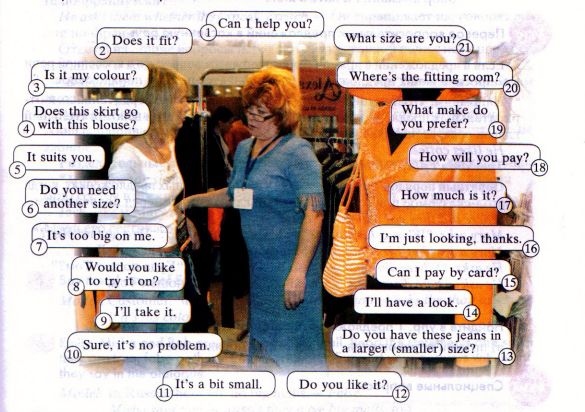
2 Match the expressions from Ex. 1 with their translations.
1. Сколько это стоит?
2. У вас есть эти джинсы большего размера?
3. Я посмотрю.
4. Могу я заплатить карточкой?
5. Я просто смотрю, спасибо.
6. Где примерочная?
7. Вам помочь?
8. Какой у Вас размер?
9. Как (на мне) сидит (вещь)?
10. Это мой цвет?
11. Это подходит к этой сумке?
12. Вам идет.
13. Принести другой размер?
14. Вам велико?
15. Хотите померить?
16. Какую фирму Вы предпочитаете?
17. Я это беру.
18. Конечно.
19. Как Вы будете платить?
20. Сколько это стоит?
21. Эта юбка подходит к этой блузке?
3 Work in pairs. Make up as many mini-dialogues as you can with these sentences. You can use some sentences more than once.
Model:Customer: Do you have these jeans in a larger size?
Shop assistant: I'll have a look.
 Перевод вопросительных предложений в косвенную речь Перевод вопросительных предложений в косвенную речь
Если в предложении в прямой речи содержится вопрос, то в косвенной речи в вопросительных предложениях употребляется прямой порядок слов.
Напомним, что прямой порядок слов встречается в утвердительных и отрицательных предложениях, когда глагол-сказуемое или вспомогательный глагол следует за подлежащим. Не likes coffee.
They didn't play football yesterday.
Обратный порядок слов встречается в вопросительных предложениях, когда глагол-сказуемое или вспомогательный глагол стоит перед подлежащим. Where did they go? Where are they?
Mary asks, "What is Liz doing?"— Мэри спрашивает: "Что делает Лиз?"
Mary asks what Liz is doing. — Мэри спрашивает, что делает Лиз.
Не asks, "Where did Тот go?"— Он спрашивает: "Куда пошел Том?"
Не asks where Тот went. — Он спрашивает, куда пошел Том.
4 Найдите в упр. 1 предложения, в которых встречается:
а) прямой порядок слов б) обратный порядок слов
 Специальные вопросы Специальные вопросы
В специальных вопросах в косвенной речи после вопросительного слова следует прямой порядок слов.
She asks John, "Where does Tom go every week?"— Она спрашивает Джона: "Куда ходит Том каждую неделю?"
She asks John where Tom goes every week. — Она спрашивает Джона, куда ходит Том каждую неделю.
В вопросе к подлежащему в косвенной речи порядок слов не меняется. Не asks, "Who likes pop music?"— Он спрашивает: "Кто любит поп-музыку?"
Не asks who likes pop music. — Он спрашивает, кто любит поп-музыку.
Общий вопрос в косвенной речи вводится союзами if / whether Не asks Mark, "Did you see the film yesterday?" — Он спрашивает Марка: "Ты видел фильм вчера?"
He asks Mark if he saw the film yesterday. — Он спрашивает Марка, видел ли он фильм вчера.
Не asks them, "Do you speak French?" — Он спрашивает их: "Вы говорите по-французски?"
Не asks them whether they speak French. — Он спрашивает их, говорят ли они по-французски.
Ответы на общие вопросы передаются в косвенной речи с помощью подлежащего и вспомогательного глагола.
"Did Jim phone yesterday?" Ann asks her mum. "No," Mum says. — "Джим звонил вчера?" — спрашивает маму Анна. "Нет",— говорит мама.
Ann asks her mum if Jim phoned yesterday and Mum says that he didn 't. — Анна спрашивает маму, звонил ли Джим вчера, и мама говорит, что он не звонил.
Разделительные вопросы передаются в косвенной речи так же, как общие.
"Mary saw ту sister on Sunday, didn't she?" Jack asks. — "Мэри видела мою сестру в воскресенье, не так ли?" — спрашивает Джек.
Jack asks if Mary saw his sister on Sunday.— Джек спрашивает, видела ли Мэри его сестру в воскресенье.
5 Say the phrases of Ex. 1 in reported speech.
Model:Customer: "Is it my colour?"— The customer asks the shop assistant
if it's his colour.
6 Emily, Misha and Rob are at the shopping mall. Read the statements and say if they are true, false or there's no information. Support your answers with what they say in the dialogue.
Model:In Russia there are no big malls. — False.
Misha says that in Russia they have big malls, too.
1. Some shops in Russia close at night.
2. Stores in America close at night.
3. Most English shops close at around 6 p.m.
4. Some English shops are open at weekends.
Rob:Wow, this place is really huge!
Emily: We call it a mall. There are more than a hundred stores in it!
Misha:In Russia we have some malls too.
The biggest ones are in Moscow.
You can spend the whole day
there and they are open at night too.
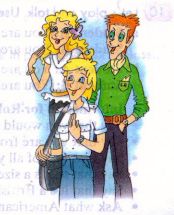
Rob: I'd love to do some shopping at night. But shops in England normally close at around 6 p.m.
Emily: Our stores close really late and they are open at the weekends too.
Rob: Let's hurry up then! We'll need the whole day to see all the shops. I'd like to start with that shoe shop over there. There are sale signs in the windows.
7 Read the dialogue for detail and say what happened to Rob. Try to guess why he had a problem.
In a shoe shop
Shop assistant: Can I help you?
Rob: Yes please. I'd like a pair of trainers.
Shop assistant: What make do you prefer?
Rob: Have you got Nike trainers?
Shop assistant: Sure. What colour would you like?
Rob: White, please.
Shop assistant: And what size are you?
Rob: Six and a half.
Shop assistant: Have you are.
Emily: They look nice, Rob. Try them on!
Shop assistant: How do they feel?
Rob: Awful! They're too small.
Shop assistant: But they're your size.
Rob: What's wrong with my feet? Have they grown in a week?
Emily: Don't panic, Rob. I know what it is.
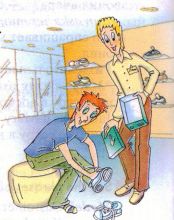
8 Listen to the dialogue and check your answers.
9 Retell the dialogue of Ex. 7 using reported speech.
10 Let's play and talk. Use the information below for your own conversations.
a) Student A: You are Rob. Your information is on this page. Student
B: You are a shop assistant. Your information is on page 79.
b) Student A: You are a shop assistant. Your information is on page 79. Student
B: You are Misha. Your information is on this page.
Information for Rob:
• Say that you would like to buy some presents for your family.
• Say that you are from the UK.
• Say that first of all you'd like to buy a sweater for your mother.
• Say that she is a size 12.
• Say that it's a British size.
• Ask what American size you need.
• Say that you'd like to buy a funny T-shirt for your sister Rosy.
• Say that she is a size 10.
• Say that it's a British size.
• Ask what American size you need.
• Say that your father would like a pair of trainers.
• Say that he's a size 8.
• Say that it's a British size.
• Ask what American size you need.
Information for Misha:
• Say that you would like to buy some presents for your family.
• Say that you are from Russia.
• Say that you'd like to buy a blouse for your mother.
• Say that she is a size 48.
• Say that it's a Russian size.
• Ask what American size you need.
• Say that you'd like to buy a cool top for your sister Masha.
• Say that she is a size 42.
• Say that it's a Russian size.
• Ask what American size you need.
• Say that your grandfather would like a jacket.
• Say that he's a size 54.
• Say that it's a Russian size.
• Ask what American size you need.
• Say that your father would like a pullover.
• Say that he is a size 50.
• Say that it's a Russian size.
• Ask what American size you need.
Homework
A Write the complete form of these questions. Work in pairs and ask in class...
1. what size shoes he/she is.
2. if he / she likes to stand out.
3. if he / she cares about fashion.
4. if his / her clothes were bought in the sales.
5. which clothes he/ she prefers.
6. where he / she buys clothes.
7. if he / she reads fashion magazines.
8. who helps him / her to choose clothes.
В Emily is trying some clothes on. Her family is helping. Which reactions are negative / positive? What do you think of her clothes?
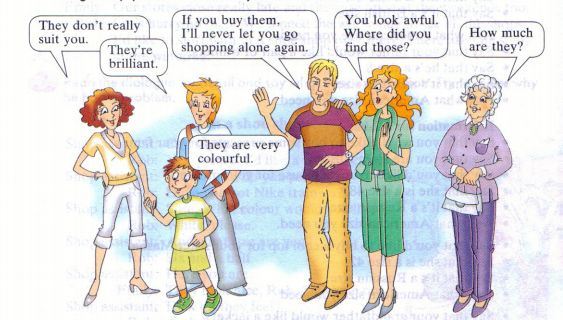
 Write about how everybody reacts. Write about how everybody reacts.
Model:Emily's little brother says that her clothes are very colourful.
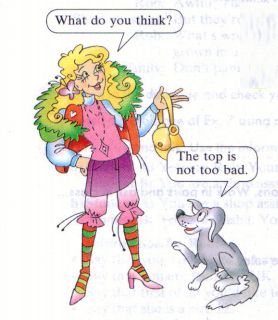
С Make up two dialogues from these phrases.
1. My Russian size is 41.
2. What size do you wear?
3. I'd like to buy a jacket for my brother.
4. Thanks a lot.
5. His Russian size is 44.
6. OK. Your US size is 8. Here you are.
7. How do they feel?
8. OK, no problem. The US size is 34.
9. May I try them on?
10. Sure.
11. OK let me have a look.
12. We do, but they're another make.
13. I'd like to buy a pair of trainers.
14. What size is he?
15. I'm afraid they're too big. Do you have a smaller size?
D Read the column from a teenage fashion magazine. Match the questions with the answers. Write a short version of the question and make dialogues using reported speech.
Model: have a job interview tomorrow.
I really need this job and I'm very nervous.
It's a fancy restaurant where I'd like to work. What should I wear?
TINA GLAM: Wear something you feel comfortable in.
Jessie from Boston asks what she should wear for a job interview and
Tina advises her to wear something that she feels comfortable in.
Your fashion questions answered by Tina Glam!
1. SHARON FROM NEW YORK: Hello! I have a pink jacket and I am wearing dark blue jeans. I don't know what top to wear under my jacket. I used to wear a lot of green and black with it, but I don't want to wear the same thing this time. Please help.
2. KASSIE FROM WASHINGTON: I am 15 years old, and I have a short body and long legs. Sometimes I get very upset, because I think with my body type nothing looks good. Do you have any tips for me?
3. ERICA FROM DENVER: HI! I'm looking for a stylish waterproof jacket. I want to wear it instead of my usual coat this spring. Where would be the best place to buy it?
4. INGRID FROM CHICAGO: I am 16 and I want to be a clothes designer when I grow up. I already have some drawings and I make a lot of clothes for my friends and family. My question is, "How can I start a career while I'm still so young?" Thanks.
5. DIANA FROM Los ANGELES: My friends tell me I should dye my hair. My natural colour is light brown? What colour would be best for me?
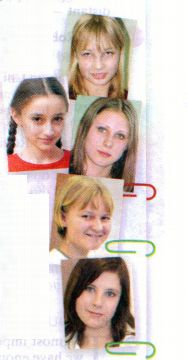
1. TINA GLAM: Try to contact FIT — Fashion Institute of Technology in New York City!
2. TINA GLAM: A big department store like Macy's may have something for you.
3. TINA GLAM: Try a darker colour if it suits your personality better.
4. TINA GLAM: Short skirts will look just great on you!
5. TINA GLAM: YOU can try a white or a red top!
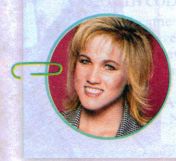
К. И. Кауфман, М. Ю. Кауфман Английский язык: Счастливый английский.ру / Happy English.ru: Учебник англ. яз. для 9 кл. общеобраз. учрежд.— Обнинск: Титул, 2008.— 288 с: ил.
Календарно-тематическое планирование, задачи школьнику 9 класса по английскому языку скачать, Английский язык онлайн
Содержание урока
 конспект урока конспект урока
 опорный каркас опорный каркас
 презентация урока презентация урока
 акселеративные методы акселеративные методы
 интерактивные технологии
Практика интерактивные технологии
Практика
 задачи и упражнения задачи и упражнения
 самопроверка самопроверка
 практикумы, тренинги, кейсы, квесты практикумы, тренинги, кейсы, квесты
 домашние задания домашние задания
 дискуссионные вопросы дискуссионные вопросы
 риторические вопросы от учеников
Иллюстрации риторические вопросы от учеников
Иллюстрации
 аудио-, видеоклипы и мультимедиа аудио-, видеоклипы и мультимедиа
 фотографии, картинки фотографии, картинки
 графики, таблицы, схемы графики, таблицы, схемы
 юмор, анекдоты, приколы, комиксы юмор, анекдоты, приколы, комиксы
 притчи, поговорки, кроссворды, цитаты
Дополнения притчи, поговорки, кроссворды, цитаты
Дополнения
 рефераты рефераты
 статьи статьи
 фишки для любознательных фишки для любознательных
 шпаргалки шпаргалки
 учебники основные и дополнительные учебники основные и дополнительные
 словарь терминов словарь терминов
 прочие
Совершенствование учебников и уроков прочие
Совершенствование учебников и уроков
 исправление ошибок в учебнике исправление ошибок в учебнике
 обновление фрагмента в учебнике обновление фрагмента в учебнике
 элементы новаторства на уроке элементы новаторства на уроке
 замена устаревших знаний новыми
Только для учителей замена устаревших знаний новыми
Только для учителей
 идеальные уроки идеальные уроки
 календарный план на год календарный план на год
 методические рекомендации методические рекомендации
 программы программы
 обсуждения
Интегрированные уроки обсуждения
Интегрированные уроки
Если у вас есть исправления или предложения к данному уроку, напишите нам.
Если вы хотите увидеть другие корректировки и пожелания к урокам, смотрите здесь - Образовательный форум.
|

















